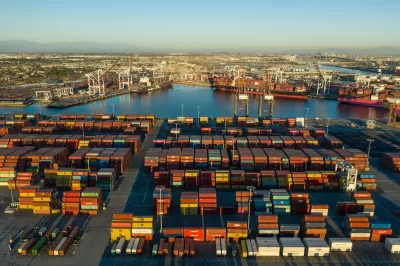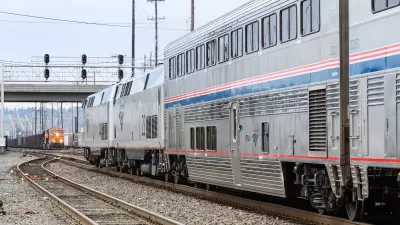The project, which will break ground this summer, is expected to dramatically curb emissions from trucking.

The rail yard at the Port of Long Beach, one of the nation’s busiest, is about to double in size after the port breaks ground on a massive expansion project later this year, reports Isabel Sami in L.A. Business First.
The project centers on a $1.6-billion on-dock rail support facility that will expand the yard from 11 to 48 rail tracks and “enhance on-dock rail capacity at the port’s shipping terminals by expanding the existing Pier B rail yard and connecting it to on-dock rail facilities and the Alameda Corridor railway.”
The entire project is slated for completion by 2032, with some components becoming operational sooner. According to Port of Long Beach CEO Mario Cordero, “completion of the project will reduce nitrogen oxide emissions by 26%, sulfur oxide emissions by 80% and particulate matter by about 85%” by streamlining rail operations and reducing truck trips. “Cordero said the project will get more trucks off the road, cutting emissions from the diesel-powered trucks that the port is looking to eliminate.”
The project is partly funded by $158 million from the California State Transportation Agency and $79 million in grant funding from the Los Angeles County Metropolitan Transportation Authority (Metro), the California Department of Transportation (Caltrans) and the U.S. Department of Transportation.
FULL STORY: Port of Long Beach rail expansion project to break ground this summer

Planetizen Federal Action Tracker
A weekly monitor of how Trump’s orders and actions are impacting planners and planning in America.

Chicago’s Ghost Rails
Just beneath the surface of the modern city lie the remnants of its expansive early 20th-century streetcar system.

San Antonio and Austin are Fusing Into one Massive Megaregion
The region spanning the two central Texas cities is growing fast, posing challenges for local infrastructure and water supplies.

Since Zion's Shuttles Went Electric “The Smog is Gone”
Visitors to Zion National Park can enjoy the canyon via the nation’s first fully electric park shuttle system.

Trump Distributing DOT Safety Funds at 1/10 Rate of Biden
Funds for Safe Streets and other transportation safety and equity programs are being held up by administrative reviews and conflicts with the Trump administration’s priorities.

German Cities Subsidize Taxis for Women Amid Wave of Violence
Free or low-cost taxi rides can help women navigate cities more safely, but critics say the programs don't address the root causes of violence against women.
Urban Design for Planners 1: Software Tools
This six-course series explores essential urban design concepts using open source software and equips planners with the tools they need to participate fully in the urban design process.
Planning for Universal Design
Learn the tools for implementing Universal Design in planning regulations.
planning NEXT
Appalachian Highlands Housing Partners
Mpact (founded as Rail~Volution)
City of Camden Redevelopment Agency
City of Astoria
City of Portland
City of Laramie





























